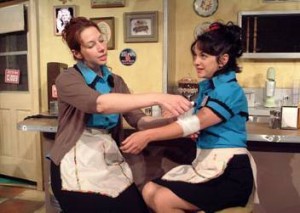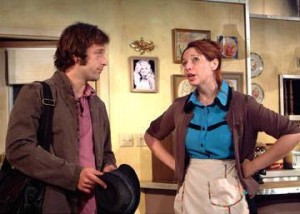RECOMMENDED
The small-town diner has proven the surefire setting for numerous movies, TV
shows, plays, and musicals, from Alice, to Pump Boys and Dinettes, to The
Spitfire Grill to…Diner. Add to that list Jessie McCormack’s very funny new play
Journey to Dollywood, now at the Matrix Theatre.
Journey to Dollywood tells the story of small town waitress Jolene
(McCormack), named after the homewrecking hussy of Dolly Parton’s
eponymous hit, which is, as one character puts it, “like naming a baby Lolita or
Whore.” No matter. Waitress Jolene is Dolly’s biggest fan, and considers the
song Jolene to be Parton’s “seminal masterpiece.”
McCormack’s play begins with a pair of video montages, the first recounting
Parton’s rise from poverty to fame and fortune, the second following Jolene’s
rise to…a job in a diner. We then meet sad-faced Jolene, with dreams of
journeying to Dollywood but stuck in a dead-end job; fellow waitress Cici (perky
and sassy Melissa Greenspan), a pint-sized ball of energy; and tall, rough, potty-
mouthed Manny (Erik Van Wyck), a New Yorker who settled in this sleepy
southern town after inheriting not only the diner, but the adjoining motel and
car repair shop as well. Part of the fun of Journey to Dollywood is seeing this
Southern girls/Northern boy culture clash, leading to one of the funniest series
of one-liners this side of Neil Simon.
Into this world steps Joshua (Henry Gummer), from somewhere out west, on his
way to New York City to pursue his career as a musician but delayed here in
“Hicksvile” by car trouble. Serendipitously named after Parton’s 1975 “huge
big hit,” and sporting a “lustrous head of hair,” Joshua is a fish out of water,
whose visit (as might be expected) alters the lives of these three diner denizens.
Waitress Jolene is saddled with a morbidly obese, terminally ill (offstage)
mother, but following Dolly’s words of wisdom, she holds to the truth that “if
you want the rainbow, you gotta put up with some rain,” and believes
fervently that she will someday visit the Promised Land—Dollywood. Dolly
Parton (on the record player) was Jolene’s childhood babysitter, and her
signature song Coat of Many Colors gave Jolene hope and pride. Parton
continues to be Jolene’s mentor, her guru, her guide through life as, in a series
of funny bits, we hear snippets of Parton hits whenever someone or something
calls them to Jolene’s mind. “Some people look to the Dali Lama for wisdom,
but I look to another Dolly,” explains Jolene to Joshua.
Journey to Dollywood’s wispy plot concerns Jolene’s on again off again
relationship with Manny (she’s called off their wedding four times), her sudden
smittenness with Joshua, and Cici’s desire to be promoted from diner to motel
clerk. There are flashbacks to Jolene and Manny’s courtship (aided by subtle
shifts in Kimberly Negrete’s very good lighting), and at the beginning of Act 2,
a funny dream sequence, narrated by Dolly Parton herself, as Jolene imagines
herself marrying both Manny and Joshua. (Parton warbles, “She was torn
between to loves, one was a Jew, the other was a cuckoo,” after which she
wisecracks, “Oh, they can’t all be winners.”)
McCormack does very good work as Jolene, capturing both her hope and her
hopelessness. Canadian Van Wyck becomes a 100% New Yorker in a strong
performance as Manny, who punctuates nearly every remark with the F word
(“Get a load of Chuck F***ing Schulz,” he exclaims about Joshua during in an
argument regarding which Peanuts character was always surrounded with a
cloud of dirt.) Perky, adorable Greenspan gets the biggest share of laughs as
the ditzy Cici. Finally, Henry Gummer, himself a newly arrived (in L.A.) musician,
serves as a wonderful straight man to the other characters, with his deadpan
delivery and sad but sparkling eyes.
McCormack displays many strong points as a playwright. Unlike a number of
other recent world premieres, Journey to Dollywood is written like a real play
and not like a screenplay. The first act is a single scene taking place in real
time (except for the two aforementioned flashbacks) and the second act has
just two extended scenes, a refreshing change from the multiple short scene
format which slows down more filmic scripts with repeated blackouts and set
changes. McCormack is also a master of the one-liner. In the first act, her
rapid fire jokes rival Neil Simon’s. On the other hand, I was not particularly
comfortable with the abrupt switch (in Act 2) to some rather stark drama, and
if I could offer one suggestion, it would be for some script tweaking to make
the two acts into one cohesive whole. Also, those (unlike “anything goes”
myself) who are uncomfortable with swearing (from Manny) and profanity
(from Jolene and Cici) might find some of the script a bit hard on the ears.
Those caveats aside, Journey to Dollywood is a very entertaining, funny, and
hope-inspiring 100 minutes of good solid entertainment. The performances are
winning, the one-liners very funny indeed, and the message of hope and
perseverance worth repeating. The play evoked loud audience cheers at
curtain calls, and the friend I invited as my guest declared, “This is the best
play you’ve taken me to.” Since I’ve taken this friend to some very good
shows (including the excellent Gulliver’s Travels, Come Back Little Sheba, and
The Women of Lockerbie), this is high praise indeed.
Matrix Theatre, 7657 Melrose Avenue, Los Angeles.
www.plays411.com/dollywood
–Steven Stanley
September 16, 2007




 Since 2007, Steven Stanley's StageSceneLA.com has spotlighted the best in Southern California theater via reviews, interviews, and its annual StageSceneLA Scenies.
Since 2007, Steven Stanley's StageSceneLA.com has spotlighted the best in Southern California theater via reviews, interviews, and its annual StageSceneLA Scenies.







 COPYRIGHT 2024 STEVEN STANLEY :: DESIGN BY
COPYRIGHT 2024 STEVEN STANLEY :: DESIGN BY